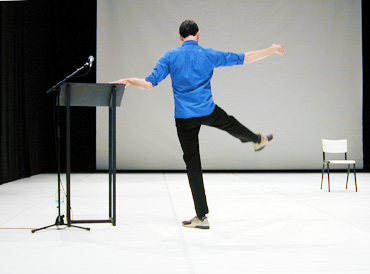Thinking in art is not valued too highly. On the one hand – too much conceptual dance, all that brainy theatre, enigmatic images and installations, all that stuff-in-progress, too little beauty, too little emotion, too little flesh and blood. On the other hand: thinking in art enjoys great esteem. There is scarcely a theatre, a festival, or a museum that wouldn’t now and then resort to a “laboratory”, an academy, an “educational” or “research programme”; manifesta, documenta, summer academies, education is all over the place. In the meantime, it has become self-understandable to link theory and practice without a clear demarcation of spheres, to find places and formats for the representatives of art, theory, and everyday life and to work out something in common – with the high claim of not only mediating, but also producing theory. But is it the task of a festival, a theatre, an exhibition house, which eventually obtain their tax moneys for producing and presenting art, to do research, to enforce discourses, to mediate and create knowledge?
Perhaps they should rather focus on the core business: curtain up, curtain down. Vernissage, finissage.
* * * * *
There are no real beginnings: they are made retrospectively. Hans Blumenberg has once told such a story, which should open our eyes to the apparently absolute incompatibility of theory and practice. Referring to an ancient Aesop’s fable in his “Theaetetus”, Plato described a sort of early philosophical accident: Thales of Miletus – and astronomer in the sense of proto-philosopher, who has often been retrospectively called the founder of Greek philosophy – stepped out of his house one night in order to contemplate the stars. Deeply focused on his heavenly objects in the manner of an absent-minded professor, he tumbled down into a well of water. A far more practical handmaid, who was witnessing the embarrassing situation, laughed at him and jested, “that he was so eager to know what was going on in heaven, that he could not see what was before his feet. This is a jest which is equally applicable to all philosophers.” (Plato).




